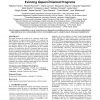Free Online Productivity Tools
i2Speak
i2Symbol
i2OCR
iTex2Img
iWeb2Print
iWeb2Shot
i2Type
iPdf2Split
iPdf2Merge
i2Bopomofo
i2Arabic
i2Style
i2Image
i2PDF
iLatex2Rtf
Sci2ools
123
click to vote
ICSE
2010
IEEE-ACM
2010
IEEE-ACM
An exploratory study of fault-proneness in evolving aspect-oriented programs
This paper presents the results of an exploratory study on the fault-proneness of aspect-oriented programs. We analysed the faults collected from three evolving aspect-oriented systems, all from different application domains. The analysis develops from two different angles. Firstly, we measured the impact of the obliviousness property on the fault-proneness of the evaluated systems. The results show that 40% of reported faults were due to the lack of awareness among base code and aspects. The second analysis regarded the fault-proneness of the main aspect-oriented programming (AOP) mechanisms, namely pointcuts, advices and intertype declarations. The results indicate that these mechanisms present similar fault-proneness when we consider both the overall system and concern-specific implementations. Our findings are reinforced by means of statistical tests. In general, this result contradicts the common intuition stating that the use of pointcut languages is the main source of faults in...
Aspect-oriented | Aspect-oriented Programming | ICSE 2010 | Main Aspect-oriented Programming | Software Engineering |
Related Content
| Added | 12 Oct 2010 |
| Updated | 12 Oct 2010 |
| Type | Conference |
| Year | 2010 |
| Where | ICSE |
| Authors | Fabiano Cutigi Ferrari, Rachel Burrows, Otávio Augusto Lazzarini Lemos, Alessandro Garcia, Eduardo Figueiredo, Nélio Cacho, Frederico Lopes, Nathalia Temudo, Liana Silva, Sérgio Soares, Awais Rashid, Paulo Cesar Masiero, Thaís Vasconcelos Batista, José Carlos Maldonado |
Comments (0)

